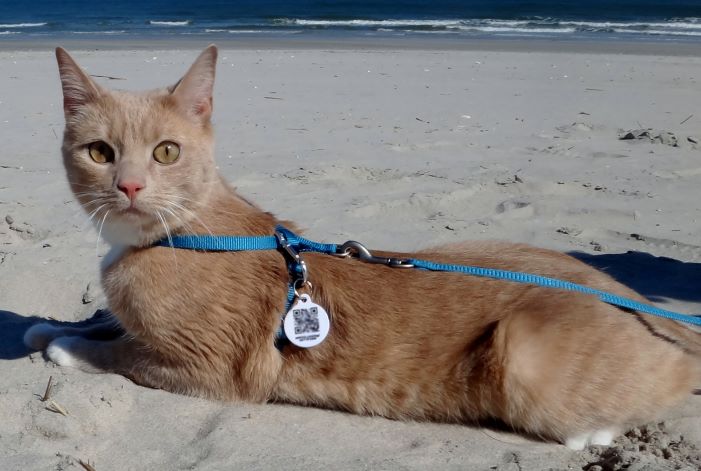
As pet parents, we understand it is very stressful and can be heartbreaking to have a beloved cat go missing. It’s important to know that you are not alone in this experience; many cats get lost each year due to the variety of scenarios they may find themselves in.
Here at PetHub, we want to provide you with sound advice and helpful tips crafted from decades of expertise when it comes to stray or lost animals. This article details some common situations cats may end up in if they lose their way and how those scenarios can be prevented for our furry friends’ safety.
Preventative Steps to Avoid Losing Your Cat
Proper Identification
Losing a cat can be a heart-wrenching experience for any pet parent. That's why taking preventative steps to avoid losing your feline friend is crucial. One simple yet effective measure is to microchip your cat. This little chip inserted under your cat's skin contains all the necessary information to help reunite you with your fur baby should they go missing.
Lastly, we strongly suggest getting a collar with identification tags for your cat. Sure, a lot of cats hate collars, but an ID tag is the fastest way missing cats make it home. This simple measure can make all the difference in providing crucial information to those who might find your cat. PetHub has small, extremely light digital ID tags that work perfectly for cats.

Speaking of cat collars, you do need to do your homework and get one meant for cats. Also, if you have an outdoor access cat, we recommend having a separate message tag. A tag that clearly says, "I'm not lost, just exploring" can be the difference between your cat coming home each night or your cat spending time in a shelter.
Another step is to keep your cat inside your home or supervised when outside. Frankly, PetHub's stance is to always keep your cat inside, unless you take them out to explore while wearing a leashed harness. Cats are natural explorers, but without proper supervision, they can quickly get lost or wander too far from home.
Why Keeping Your Cat Indoors is Best
As a cat parent, it can be tough to decide whether to let your feline friend roam freely outdoors or keep them indoors. While outdoor adventures can be exciting for your cat, they also come with numerous risks. From busy roads to run-ins with other critters, it's not uncommon for outdoor cats to face a variety of dangers.
That's why PetHub encourages folks to keep their cats inside, where they can enjoy a safe and comfortable lifestyle. With plenty of toys, scratching posts, and cozy nooks to curl up in, indoor cats can live just as rich and fulfilling lives as their outdoor cousins. And as a bonus, keeping your cat inside can help to protect local wildlife too!
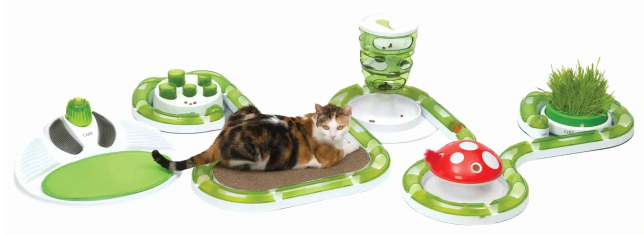 Things like catios, window perches and other enrichment toys and structures give indoor-only cats wonderful opportunities to explore. Our absolute FAVE for all things cat enrichment is Catit. Seriously, you can build a kitty Disneyland in your home and they will never want to leave. And newer feeding products like Doc & Phoebe's Indoor Hunting Cat Feeder help curb their need to hunt and search for prey.
Things like catios, window perches and other enrichment toys and structures give indoor-only cats wonderful opportunities to explore. Our absolute FAVE for all things cat enrichment is Catit. Seriously, you can build a kitty Disneyland in your home and they will never want to leave. And newer feeding products like Doc & Phoebe's Indoor Hunting Cat Feeder help curb their need to hunt and search for prey.
An Outdoor Access Cat MUST-HAVE
It’s understandable that sometimes it's simply unavoidable to keep your kitty inside. Particularly if you've adopted them as an adult, they may simply be hard-wired to be in and out when they wish. If you must let your cat outside from time to time for free-roaming, you should definitely invest in a GPS collar device for them. Though it won't protect them from wildlife, it will help you find them when they don't come home as expected. Tractive for Cats is our favorite in this category. It's small, affordable, and very reliable.
Reasons Why Cats Get Lost
Up in the Air
The most common lost cat scenario, while many poke fun at it, is the old standby of the cat getting trapped in a tree, telephone poles, on a rooftop, or somewhere else they do not feel safe escaping on their own and need help to get down. So the first place to begin for your missing cat is to look up. Your pet may be stuck where it may be unable or afraid to escape.
Why are they up high you may wonder? Cats have the instinct to seek out elevated spaces, which can be attributed to their ancestral instincts and survival tactics.
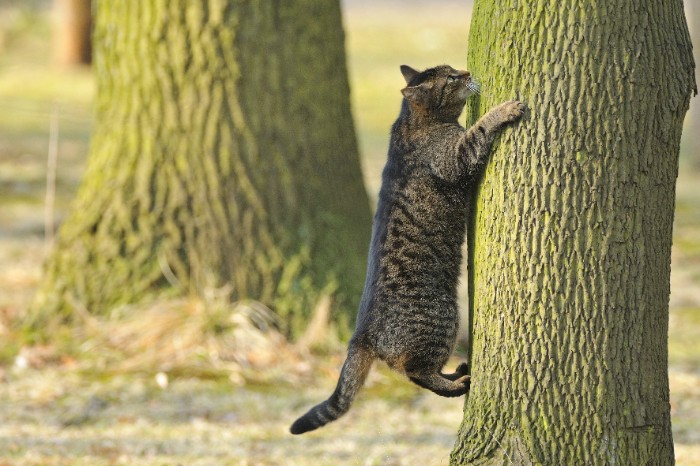
Climbing to higher grounds serves as a strategic vantage point that allows them to survey their surroundings for potential threats or prey. Height also provides a sense of security, as it enables cats to escape from perceived dangers and avoid confrontations with other animals.
Plus, elevated spaces offer a comfortable and secluded spot for cats to rest and relax, away from the hustle and bustle of daily activity. In essence, cats' inclination to get up high is driven by their instincts to stay safe, maintain control over their environment, and find solace in their private sanctuary.
As much fun as it was to get high in the first place, cat climbing can be dangerous. The riskiest time is in the summer months because your cat needs water to avoid becoming dehydrated.
If stranded waiting for help for too long, it can become a life-threatening emergency. And despite what folks believe about a cat always landing on its feet, jumping or falling from a high place is a recipe for injury.
When you find your pet in an unreachable high spot, call the local fire department or animal control. Most likely, they will have the equipment to help rescue your scared cat. If not, they likely can point you to other local resources.
Away Down Under
The next place you should look? UNDER. A panicked cat is most likely going to see comfort when lost and scared. Cats like to hide in small spaces because it makes them feel safe and comfortable. It is part of their wild nature to want protection from danger while being able to watch their surroundings.
Hidden spots also provide a sense of security when they rest or sleep, as it minimizes the risk of being disturbed or ambushed. Additionally, seeking shelter under objects can offer cats a cozy and comfortable environment, especially when it comes to regulating their body temperature.
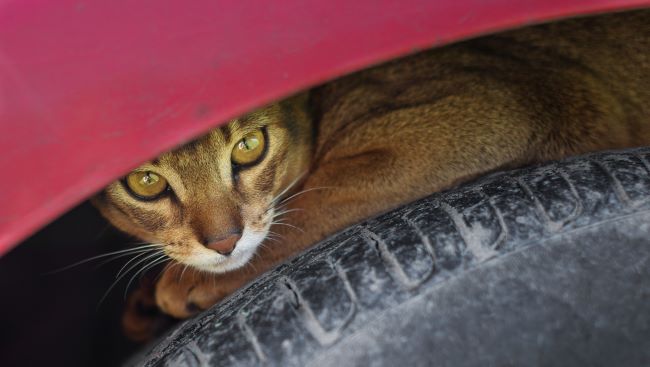
If you are sure your kitty is lost outside, get down on the ground and start searching for cozy spy holes. Look under and inside every possible hiding spot. Trust us, most cats are watching you look for them. Bushes, under porches or stairs, tucked beneath vehicles, or behind bins are some favorite lost cat spots.
Whenever looking for your cat, using a flashlight helps. Even in the day, it's dark under porches and the like, and a flashlight will reflect your pet's eyes if caught in the light's ray. Plus, in darker spaces, colors fade and blend into one another. A flashlight is a great tool because it will add additional contrast to help your eyes pick out a peak of fur hiding under something.
Hangin' Around the Neighborhood
Most lost cats stay within a five-house radius of where their owners live. Even outdoor cats tend to stake their territory as a single city block and don't wander too far from the immediate area of their home base. Start with a slow and thoughtful deep search of your property. Work in a methodical spiral and don't panic or yell as cats are looking for calm and comfort.

If you live in the city or the suburbs, and you can’t find your cat, check with every neighbor on your block. Ask if you can have permission to look under their decks, in their sheds, tire wells, or backyards and gardens. Asking “Have you seen my cat?” is likely to yield a less than thorough search or a compulsory glance, followed by a quick “Nope.” Not only is the cat more likely to come out of a neighbor's yard if you are close enough for them to see, but only you are going to take the time and care to look up and down and in every nook and cranny.
Every so often a cat will be "rescued" by a well-meaning neighbor. Sometimes, they recognize him as a neighborhood cat but don't know the owner. All too often, though, your super-friendly pet may find they have accidentally become a member of a new household. This is why we always suggest a door-to-door search and questioning of your neighbors.
Licking Their Wounds
If a feline is injured or sick, it is often the instinct for them to hide somewhere. If you have a cat that is older or has an ongoing illness, this is a very common reason for them to be missing. If this is the case, you must find them quickly so that you can get them prompt medical attention that may save their life.
In the event the cat is injured, they are usually on your property, or somewhere on a neighbor’s property, well hidden from people and other critters alike. Cats that are injured are at greater risk for further harm from wild animals or even other stray or feral cats.
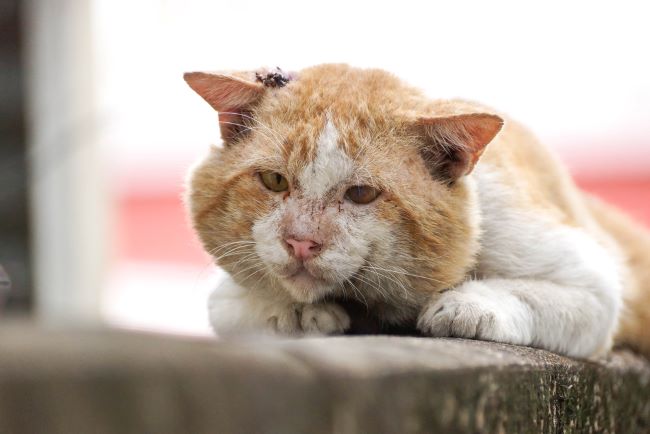
When searching for an injured or sick cat, it is crucial to approach the situation with patience and attention. Indoor sick or injured cats are likely hiding in quiet, secluded spaces. Look under furniture, in closets, behind large appliances, under stairwells, and even under beds up inside of box springs.
An outdoor access cat may have gone outside to escape being around the hubbub of your busy home. Once you've determined they are not inside, search garages, sheds, under porches and any other nearby hiding spots where a cat might take refuge. They likely have not gone very far if they are not feeling well.
Pay attention to any unusual sounds, such as faint meowing, which could indicate their presence. If you believe your cat may be outdoors, enlist the help of neighbors and friends to cover more ground and increase the likelihood of finding them. Remember to bring a flashlight for better visibility, especially if searching at night.
The Pet Safety Crusader, Denise Fleck, wrote a great article for PetHub about what do when you find your lost pet. The TLDR: when you locate the injured or sick cat, approach them gently and calmly, avoiding sudden movements that might startle or stress them further. If possible, use a blanket or towel to carefully pick up the cat, do any necessary immediate first aid and transport them to a veterinarian for medical attention.
Ticket to Ride
Believe it or not, cats can get lost and end up in places they don't know by mistakenly hitching a ride with a stranger (or you). In these situations, they are scared and don't know what to do, so they often start running, looking for safety.
For instance, a cat hiding in a moving box during a house relocation or sneaking into a delivery truck could find itself far from home. In a home moving situation, it is essential for everyone to carefully inspect and secure boxes, vehicles, and any other items being transported, ensuring that no cat is unintentionally enclosed.
And how many times have you been packing and the cat just won't stay out of the suitcase? Imagine if you didn't realize he fell asleep in there and accidentally transported him to the airport. It wouldn't be the first time TSA found a stowaway!
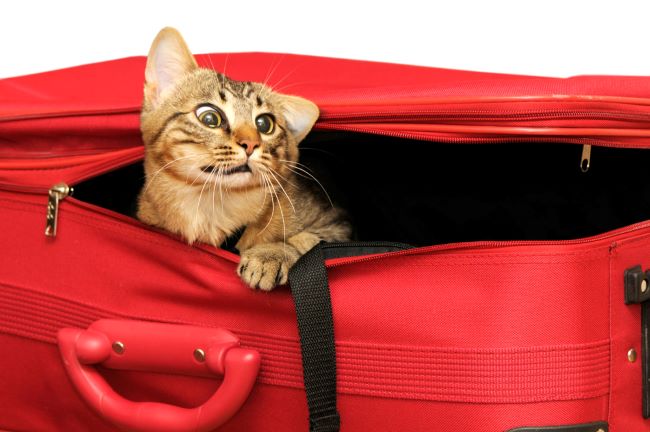
Another surprisingly common lost cat situation is a cat sleeping in a truck bed or inside a car that left the windows open. The vehicle may be blocks or even miles away before the cat can escape the car and try to find its way home. Cats will crawl into anything they find that looks cozy when they want a snooze.
The best way to prevent your cat from going on an unsanctioned trip? Don't let your cat free roam outside. It's simply the best way to ensure your pet doesn't take an unplanned long road trip with a stranger to an unfamiliar, scary location.
Stranger Danger
No one likes to think about it, but sometimes people are mean jerks and do bad things to cats. In particular, holidays like Halloween and the 4th of July can be very dangerous for outdoor cats. Though not common, people do steal cats to harm them. The best prevention? You guessed it...keep them inside.
Do you know who else can be mean jerks? Carnivores like coyotes, wolves, bobcats, and mountain lions. Okay, sure, they are just following their instincts when they hunt pet cats. It's still awful to think that your kitty could get on the bad end of the food chain, though.
Even suburban areas can have their local wildlife. Even a raccoon can mean danger to a cat's wellbeing. The ultimate way to protect your fur kid? Yup. You guessed it. Keep them inside.
Another not-so-uncommon occurrence is for someone to "accidentally" steal your pet when they believe they are rescuing them. They may believe your cat is lost and take them to a local shelter when you know they were just making their standard rounds of the street.
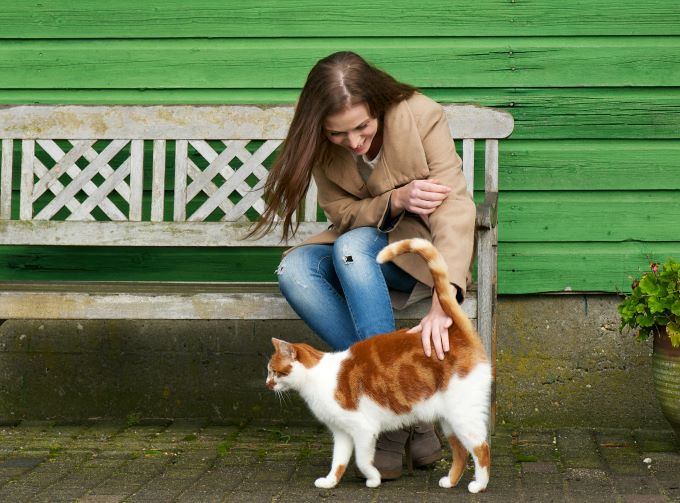
See the cat in the photo above? Recipe for disaster. He's not wearing a collar and ID and he is super friendly. Many good-hearted folks are trying to do the right thing by "adopting" your missing cat and making them part of their own family.
Once again, that's why we recommend making a thorough search throughout your neighborhood if your pet doesn't come home one evening for supper. And, of course, get a tag and collar on that kitty!
Scaredy Cat
Much like an ill or injured cat, another common missing cat scenario is a kitty that's bolted out of fear. If an outdoor-access cat disappears, it is more than likely because something has happened to that cat. In best-case scenarios, that kitty is simply scared, and not badly injured or worse.
Local shelters are filled with lost pets right after the 4th of July and other major holidays due to fireworks traumatizing pets all night long. In addition to fireworks, other loud noises, and attacks from other critters can all drive a cat to escape the scary trigger and hide.
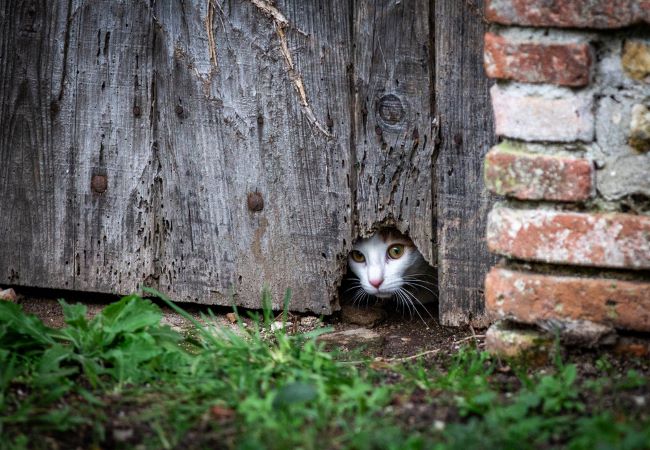
If they are in their normal territory, they are likely in their favorite hiding spot (look up and under). And remember, for an indoor-only cat, being outside means they are instantly in unfamiliar territory. Go back and review those first two common scenarios. Your missing cat is most likely up high or hunkered down below.
Playing Hide-n-Seek at Home
We won't laugh at you if you panic start a neighborhood search for your lost cat only to find the little stinker was asleep under freshly washed clothes in a laundry basket. We won't tease you because it's happened to us and it happens all the time.
Many cats have a favorite hiding place in the house. It's probably super cozy and feels safe and private. It also likely gives them a great vantage point to spy on you and the rest of the household. Boxes, bags, furniture, closets, shelves, and large appliances all hold potential purr-fect spots.
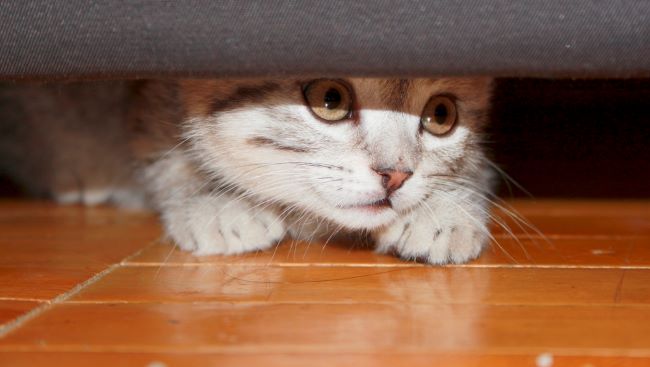
Make a point to carefully observe your pet from time to time and note their favorite hidey holes in the home. Better yet, provide them with great secret spaces with furniture designed with cats in mind. When you first note they are missing, do a physical search of those spots before you panic and form a massive outdoor search effort.
When They Just Don't Come Home
If a pet is missing for more than a few days, they are in desperate need of food and water and believe it or not, human contact. Sometimes, it will be necessary to use humane traps to corral your missing cat. Remember, most missing cats are very close to home. A humane trap with some yummy food, fresh water, and something that smells like you will often bring them out of hiding.
All cat owners should read the research and advice from renowned pet detective Kat Albrecht to learn more about the behavior and mindset of cats that are missing. Understanding lost cat behavior can really help find a lost cat, especially one missing for two weeks or more.
Lost Cat Scenarios Wrap-up
At the end of the day, finding your lost cat really boils down to understanding the following key behaviors of cats:
- They like to be UP
- They like to hide UNDER
- They love small, cozy, secret spy holes
- They like to stay in their home territory
- They don't like company when feeling bad
- They run and take cover when scared
- They can't tell strangers they are a pet without a collar and ID
Keep these things in mind when you are planning for your cat's safety. An ounce of prevention and understanding now will help you a lot if you cat actually goes missing.



